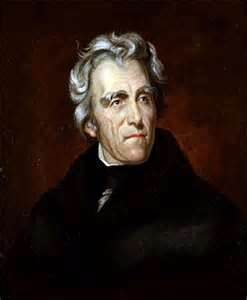Andrew Jackson: President of the People
Part 2: Fame and Spoils
His opponents might have thought him king-like, as Jackson took a more active approach to the Presidency, vetoing many high-profile bills put forward by Congress, including the extension of the charter of the Bank of the United States. He also gave more political appointments to his friends and supporters than his predecessors did, expanding what was called the "spoils system." One way in which Jackson supported the federal government, foreshadowing the actions of President Abraham Lincoln 30 years later, was in the Nullification Crisis. South Carolina, led by Vice-president John C. Calhoun, insisted that it could "nullify," or reject a federal law with which the state's residents did not agree, in this case a tariff. Jackson reiterated the supremacy of the federal government over the state governments and asked Congress to pass a law authorizing the use of troops to enforce the tariff. A compromise brokered by Henry Clay found support from both Jackson and South Carolina. In the middle of the Nullification Crisis, Jackson found time to encourage passage of the Indian Removal Act, which authorized the President to negotiate with Native American tribes for what resulted in their forced migration west, from existing U.S. states to unsettled territories, mainly what is now Oklahoma. During Jackson's two terms in office, he oversaw the relocation of more than 45,000 Native Americans. This set of actions resulted in the Trail of Tears.
Jackson served his entire two terms as a widower, his wife having died in December 1828, just two weeks after his first presidential victory. He adopted three children and eventually served as guardian for eight others. Emily Donelson, a niece, served as White House host, as did his daughter-in-law, Sarah. After ending his two terms as President, Jackson returned to Tennessee and his plantation, the Hermitage. The chronic headaches and other pains that troubled him throughout his presidency ultimately proved too much for him in 1845, and he died at home, age 78. Andrew Jackson is remembered in many ways. He is thought of as the founder of the modern Democratic Party. His face appears on the $20 bill. (He also appeared on bills of other denominations in years past.) He has appeared on many U.S. postage stamps. His name is part of a great many cities, counties, monuments, parks, and streets all over the U.S. A battleship was also named for him. First page > Rise to Fame > Page 1, 2 |
|
Social Studies for Kids
copyright 2002–2026
David White



 A combination of increasing popularity for Jackson and resulting disappointment with Adams and his policies resulted in a Jackson victory in the 1828 election, and Jackson had finally achieved his ultimate goal of being President. He was the first candidate of the new Democratic Party, which was very much the "people's party," with support from the common man even more in evidence than in the day of Thomas Jefferson. Jackson invited all manner of guests to his inauguration ball at the White House, and many people showed up wearing the best clothes they had, which in some cases, weren't all that flashy. This incident and others in which large crowds of people voiced their support for Jackson earned him another nickname, "King Mob."
A combination of increasing popularity for Jackson and resulting disappointment with Adams and his policies resulted in a Jackson victory in the 1828 election, and Jackson had finally achieved his ultimate goal of being President. He was the first candidate of the new Democratic Party, which was very much the "people's party," with support from the common man even more in evidence than in the day of Thomas Jefferson. Jackson invited all manner of guests to his inauguration ball at the White House, and many people showed up wearing the best clothes they had, which in some cases, weren't all that flashy. This incident and others in which large crowds of people voiced their support for Jackson earned him another nickname, "King Mob." Jackson was also the first presidential target of an assassin. In 1835, a man fired two guns at Jackson at very close range. Both guns misfired, and the would-be assassin was restrained.
Jackson was also the first presidential target of an assassin. In 1835, a man fired two guns at Jackson at very close range. Both guns misfired, and the would-be assassin was restrained.
